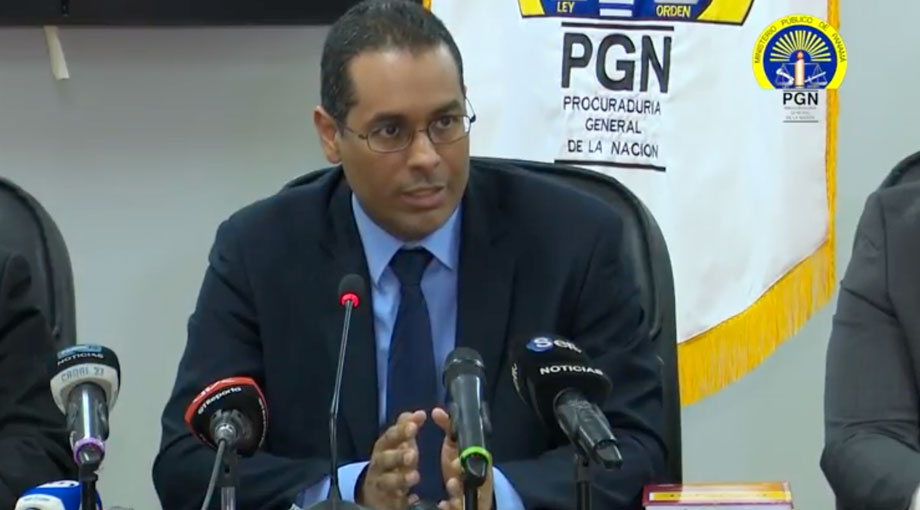Rómulo Bethancourt, one of Panama’s organized crime prosecutors, gives a press conference. Image: Ministerio Publico de Panama
Mossack Fonseca, the law firm at the heart of the Panama Papers affair, sold shell companies and held bank accounts that were used to help conceal bribes paid across South America, a Panamanian prosecutor alleged at a press conference on Thursday.
Rómulo Bethancourt, one of Panama’s organized crime prosecutors, is currently investigating Mossack Fonseca’s alleged role in an international corruption probe. The investigation, known as Lava Jato, is tracing dozens of companies that allegedly paid bribes to politicians and officials in Brazil in exchange for contracts with the state-owned oil company.
“We have a solid case,” Bethancourt said about his agency’s investigation of Mossack Fonseca, which began earlier this year. A separate investigation is ongoing into Mossack Fonseca and the Panama Papers.
Bethancourt told reporters that his office had identified two bank accounts in Panama that received “irregular” payments that were linked to Mossack Fonseca’s office in the Brazil.
Mossack Fonseca’s founders, Jürgen Mossack and Ramón Fonseca, have been detained since February in relation to the Lava Jato probe.
Mossack Fonseca’s Brazil operation “offered financial products aimed at hiding money that entered the Panamanian financial system,” Bethancourt said.
In response, lawyers for Mossack and Fonseca held their own press conference on Friday morning to respond to the prosecutor’s allegations.
The men’s lawyer, Guillermina MacDonald, said that the bank accounts mentioned by the prosecutor received legitimate administrative fees that were in no way illegal.
The bank accounts were closed after the release of the Panama Papers investigation by ICIJ and its media partners, MacDonald said. Contrary to the prosecutor’s claim, MacDonald said, the closing of the accounts was not due to the Lava Jato investigation.
Fonseca, Mossack and a third employee of the firm, Edison Teano, have been detained since Feb. 9. Mossack Fonseca’s former representative in Brazil, Maria Mercedes Riano, also remains in detention in Panama City.
Earlier this month, lawyers petitioned for the release of Mossack and Fonseca, insisting that their detention was unlawful. Panama’s criminal court has refused bail for the pair, citing the risk of flight and destruction of evidence.
Almost one year after it was first published, the Panama Papers data continues to be used by ICIJ partners in ongoing investigations, and to produce impact around the world. Among recent findings and responses:
- The Panama Papers have helped shed light on massive financial schemes allegedly used to siphon money out of Russia, according to ongoing investigations as part of the Organized Crime and Corruption Reporting Project’s (OCCRP) Russian Laundromat project. Reporters from 32 countries took part in the investigation.
- The New York Times used the Panama Papers data to reveal some of the offshore business links of a prominent Turkish businessman – known as the “Turkish Trump” – whose real estate firm is being pursued by the Trump Organization for a new Dallas hotel project.
- Details from the Panama Papers published in ICIJ’s Offshore Leaks Database have allegedly helped expose an elaborate kickback scheme whose tentacles spread from the Caribbean island of Aruba to warehouses in Florida to the offshore banking haven of Panama City, according to reporting from The Miami Herald.
- Regulators and financial institutions have continued to investigate and act on Panama Papers data: the Royal Bank of Canada recently shuttered 40 accounts linked to the affair; India’s tax authorities announced that 424 Indian clients of Mossack Fonseca were under investigation, and; in Costa Rica, authorities said they have now identified 120 companies and corporations linked to the Panama Papers.
